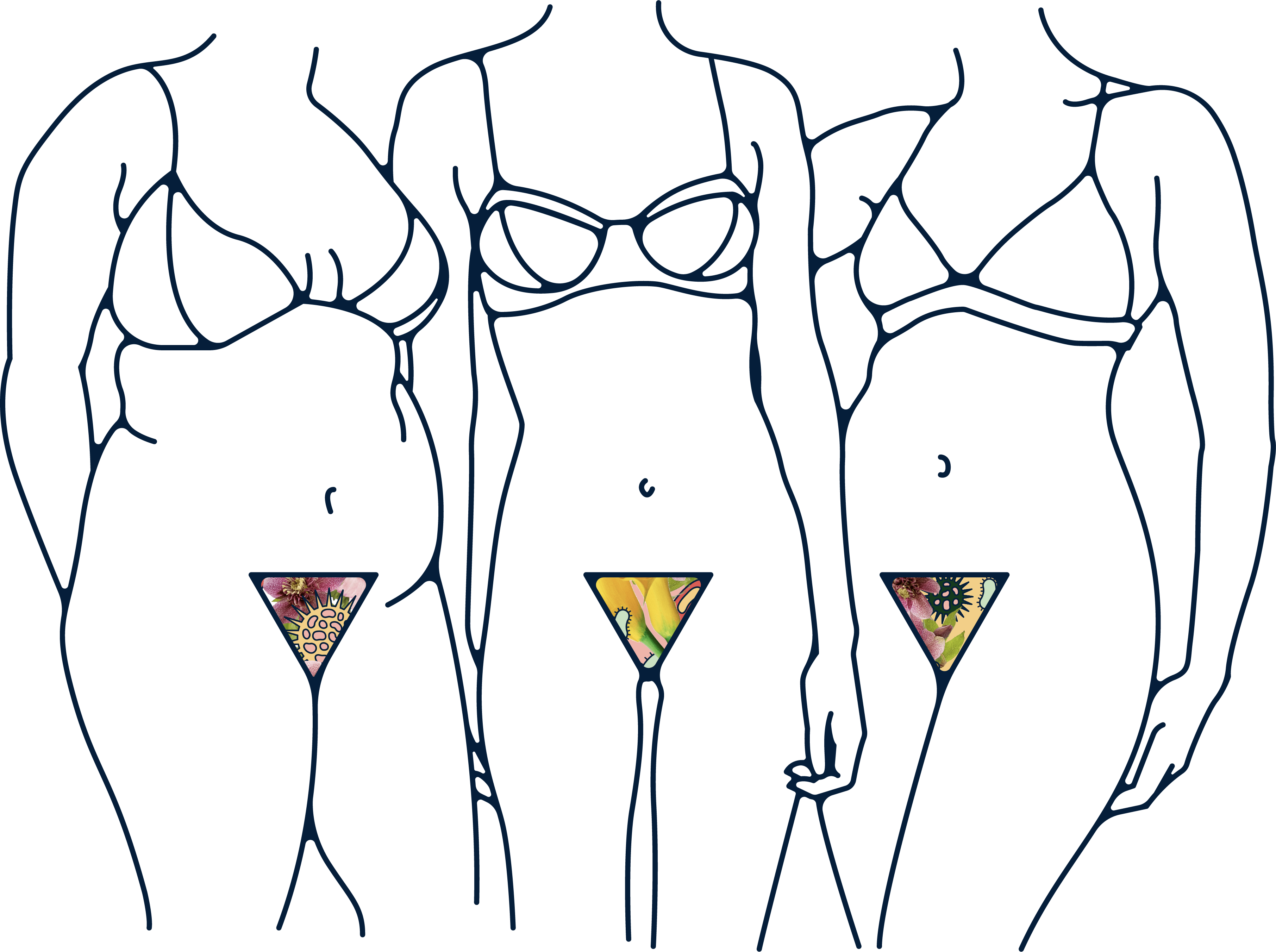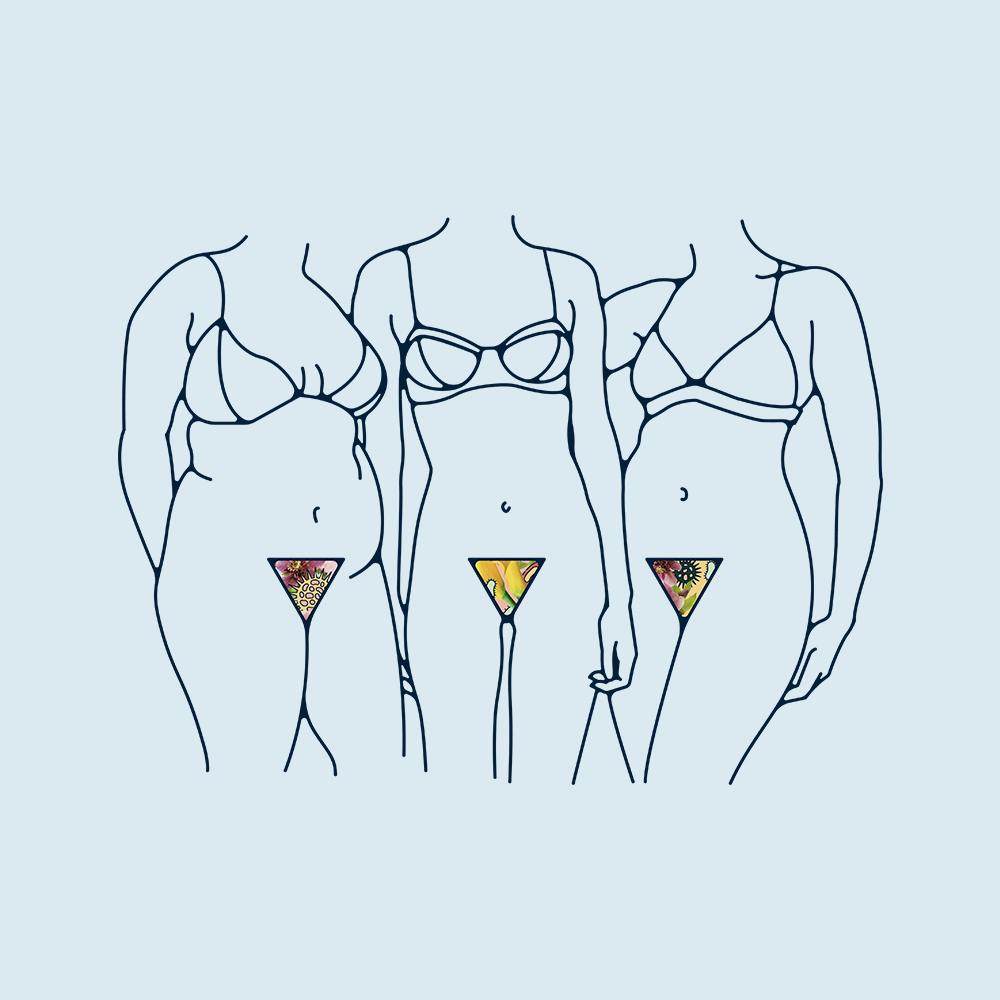Illustrated by Erin Rommel
PCOS and hirsutism
There is no known cure for Polycystic Ovary Syndrome - commonly known as PCOS - but, as many women who suffer from the condition will tell you: androgen blocking birth control can help vastly with the symptoms of PCOS. One particular symptom, hirsutism, which is male pattern hair growth (in particular facially), is especially helped by taking this contraceptive pill.
I’ve been repeatedly embarrassed by my own experiences with hirsutism, leading me to wax weekly and tweeze daily, and making me feel miserable and masculine in the in-between. At one point recently, it wore me down to the point of cancelling appointments, pub trips and dates with my partner just to stay inside and work on hair removal and my own self-esteem.

I decided to reach out to my doctor to see if they had any solutions for the androgen build-up in my body, caused by PCOS, which was, in turn, creating my visibly much darker and thicker facial and thigh hair. On the form that my GP offers to request appointments, I made sure to emphasise that my problems with PCOS weren’t solely aesthetic ones and that these issues were severely impacting my self-esteem. While I didn’t expect a miracle cure, I was hopeful there would be something on the doctor’s list of treatments that could get my beard to back off.
Instead, the phone call was largely one-sided, with whoever was responding to my request for help commenting that there is no cure for PCOS and the only thing known to help with PCOS symptoms is certain kinds of contraceptive pills. But here is where a problem arises that is only a worry for those with my body build: the pill I require to help with my condition has a weight limit.
My problem is not with the medical professional who refused to prescribe me medicine that has more risks than pay-offs - such as cardiovascular or clotting disorders as potential side-effects from this particular pill - but that a medicine to cure PCOS doesn’t exist. A medicine to treat the symptoms of PCOS solely (and not as a byproduct of contraception) doesn’t exist. And the contraceptive pill that does treat PCOS symptoms exists, but only for those who are thin enough to take it. And if that is the case, why haven’t they developed a solution that people who weigh more can take?
Fatphobia within gynaecological care
Fatphobia within gynaecological care is a widespread problem that can be both implicit and implied. For Claire, a 34 year old who was diagnosed with PCOS at the age of 15 and has two children, it was direct; she has been told repeatedly over the years that the best treatment for their condition is to lose weight.
“
I genuinely believe if I were thinner I would have been treated better. I have been consistently dismissed because I'm overweight and it has affected my quality of life because I am in discomfort.
“I'm on a form of birth control that causes reduction in bone density among other side-effects just to keep my periods under control, yet I'm not allowed a hysterectomy because I'm too young and could have more children. Except I already have two and have said I don't want any more!”
For decades the autonomy of women’s bodies and access to reproductive healthcare, such as hystorectomies and abortions, have been contested issues. When combined with fatness, our access to these treatments gets even more complex — and sometimes deadly.
This may sound like an exaggeration, but the evidence is there if you care to look. . One patient was turned away from a smear test due to her size, and two years later died from cervical cancer. It is worth noting: there is no size or weight limit on smear tests. In this case, the only possible explanation seems to be medical malpractice from a fatphobic medical professional.
It is also worth noting that treatment of reproductive health issues for plus-size people can be even harder when the individual’s identity as a fat person intersects with other protected characteristics. For example, it’s widely reported that trans people - in particular trans men - find it especially difficult to access, and be treated fairly, within the realm of reproductive health regardless of weight.
Even more than that, transitioning itself can be blocked off for trans patients if they weigh over a certain threshold, with more than a quarter of transgender or non-binary adults being told their weight makes them ineligable for gender confirmation surgery. Conversations that aim to make topics such as reproductive health and abortion more inclusive are important, but they really are just the tip of the iceberg.
Lurking under the water are much darker ways that the intersection of gender and weight can rob an individual of their right to present however they choose. And again, these issues boil down to a medical fatphobia that doesn’t consider how vital these services are to fat people and only offer weight loss as a solution. This has the knock-on effect of reiterating an unspoken message that fat people will only deserve reproductive rights when they assimilate to a thin ideal and even then as women, the options are limited.
22 year old Liv, who has depression and PCOS, looked into female sterilisation due to a phobia of pregnancy. During her enquiry into the process, she was repeatedly told her age meant she was “too young” to get the operation as she may “change her mind”. When she pushed further, she was told she was not “sane enough” to make the decision but if she “kept growing at the rate [she is], [she’d] find it difficult to get pregnant anyway and wouldn’t have to bother.” In this case, blatant fatphobia is a reminder that not only does being fat exclude many from getting treatment, but medical professionals also often use their fatphobia against us.
“When I was expecting my first daughter, I hoped to be able to have a home birth in a pool; or second to that, a water birth at a midwife-led birthing centre. I really wanted to be surrounded by midwives, rather than loads of (often male) doctors/anesthetists/etc” Maria Southard Ospina, a fat-rights activist and mother of two tells me. “Unfortunately, I learned that midwife-led birthing centres often have BMI limits. It is always assumed that a higher BMI makes a pregnancy inherently riskier,” Maria continues. “Even though there was nothing ‘wrong’ with my pregnancy, the kind of birth I wanted wasn’t really an option for me, as my BMI was higher than the guideline. I was passionately advised against home birth as well. They really don’t want fat people to have home births — I was essentially told that if I cared about my baby and my baby’s safety, I would have a hospital birth.” In the time since, Marie has had another daughter who, just like her first, is a happy and healthy child.
Regarding this particular case, it also feels important to note with the high mortality rate for Black women when giving birth, this kind of situation would likely only be exacerbated for a plus-size Black mother. In a society that operates with a misogynistic, ableist, colonialist and homophobic point of view, anyone whose fat identity intersects with any (and all!) of these identities is due to suffer more because of it.
“The NHS sets out to provide equity in care to all but sometimes misses the fact that may accidentally exclude or deter people,” Toni Jenkins, a bariatric nurse consultant explains. “This can include chairs that are flimsy or too narrow and operation gowns that don’t fasten properly. And there are still individuals that may have their own prejudices even though this may be challenged. This can include maternity sonographers under time pressure to do scans that are frustrated when scanning through fat because it produces a poorer picture. This makes the patient feel uncomfortable during a procedure that should be fun.” The problem, as Jenkins lays out, is two fold: The system has fatphobic flaws and even when the issue isn’t adequate support for plus-size patients, individuals within the medical field also have to overcome their own inherent fatphobia in order to provide inclusive care.






